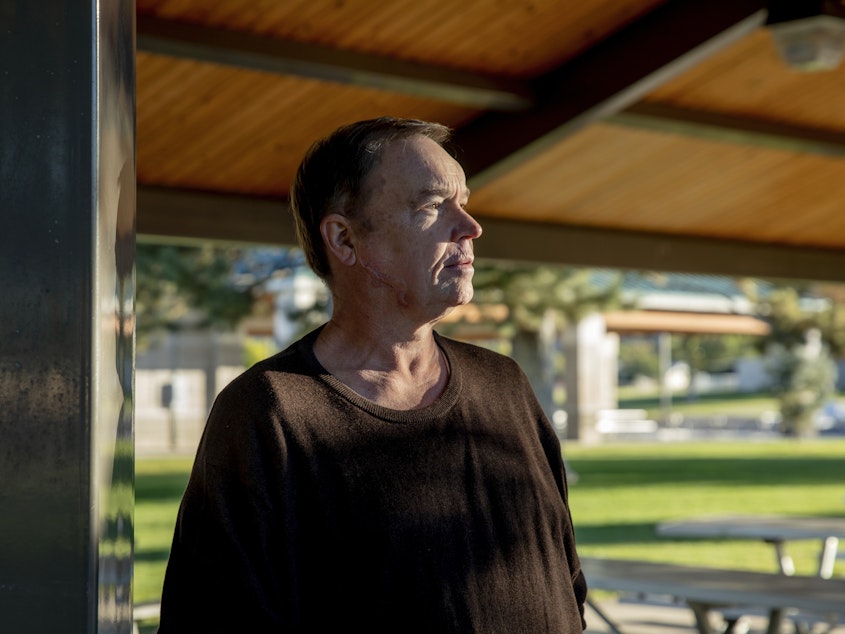A Winning Idea: Medicaid Expansion Prevails In Idaho, Nebraska And Utah

Voters in three traditionally Republican states supported ballot measures to extend Medicaid benefits to more low-income adults.
The results highlight the divide between voters, even in conservative states, who generally support providing health benefits to the poor, and conservative politicians who have rejected the expansion, which is a central part of the Affordable Care Act.
With the approval of the measures in Idaho, Utah and Nebraska, about 300,000 low-income people will gain access to health care coverage, according to estimates from government agencies and advocacy groups in those states.
"People are enthusiastic about Medicaid expansion because they recognize that it's both good for health care but it's also a compassionate thing to do," says Jonathan Schleifer, executive director of The Fairness Project, which worked to get the questions on the ballots of the four states. "And it's a financially sound thing to do. It's a fiscally responsible thing to do."
The Fairness Project is funded by the SEIU United Healthcare Workers West, a California health care workers union.
Sponsored
Voters in Montana, however, appeared to reject a proposal to raise taxes on tobacco and e-cigarettes to continue funding the state's expansion of Medicaid, which is set to sunset next year, leaving 100,000 Montanans at risk of losing coverage.
Before the Affordable Care Act, Medicaid, the government health insurance for the poor and disabled, was reserved mainly for pregnant women, children, low-income seniors and people with disabilities.
Since the law passed, 32 states, plus the District of Columbia, have expanded access to childless adults whose incomes are below 138 percent of the federal poverty level. That cutoff is $16,753 for a single person and $34,638 for a family of four.
Maine voters approved an expansion in 2017, but Gov. Paul LePage, a Republican, has resisted implementing the law, even vetoing a $60 million funding bill that passed the Legislature. LePage was barred by term limits from seeking another term. Democrat Janet Mills, Maine's governor-elect, has pledged to expand Medicaid on her first day in office.
One person who stands to gain coverage in Utah is Grant Burningham, of Bountiful. "Most of us are ecstatic," he said, referring to his friends who worked to get the measure passed. "We were all together and hugging and kissing last night."
Sponsored
Burningham has spent the past several years working for this day. A former financial adviser, he became seriously ill after having a severe reaction to a medication in 2001, lost his job, his home and his health care.
Burningham now has a place to live, and hopes that access to health care will help him get back on his feet.
Still, he's a bit wary that members of the Utah Legislature will try to do something to derail the results before the expansion of Medicaid can be implemented next spring.
"We had a win last night. But we still have the fourth quarter to go through," he said. "A lot of us are deadly sick and we'll still wait until April (after the state's legislative session ends) to turn in our applications."
Utah has come close to expanding Medicaid several times in recent years. But those efforts were blocked by conservatives in the state's House of Representatives.
Sponsored
Burningham says it was necessary to put the question directly to voters "because so many of our politicians have been out of touch with their constituents."
That's why voters had to step in, says The Fairness Project's Schleifer, who helped organize the campaign to put the measure on Utah's ballot.
"This election proves that politicians who fought to repeal the Affordable Care Act got it wrong. Americans want to live in a country where everyone can go to the doctor without going bankrupt. Expanding access to health care isn't a blue state value or a red state value; it's an American value," Schleifer said in a statement.
Utah will pay for its share of expansion costs by increasing the state's sales tax by 0.15 percentage points to 4.85 percent, which works out to about 1.5 cents for every $10 residents spend on nonfood purchases. The federal government pays for 90 percent of the health care costs incurred by those who get Medicaid benefits through the expansion measures.
RyLee Curtis, campaign managers for Utah Decides, an advocacy group that campaigned for the expansion, says many of the 150,000 Utahans who will benefit are employed, and about a third are parents.
Sponsored
"They're working one or more jobs and they're unable to afford health care coverage," she says.
Nebraska and Idaho also had Medicaid questions on ballots in their states.
In Nebraska, about 90,000 people are now eligible for coverage. And a study by two University of Nebraska professors, commissioned by the Nebraska Hospital Association, concluded that the expansion would cost the state about $148 million over three years but bring $1.36 billion in federal health funding into the state over the same time frame.
The Nebraska analysis is one of several that suggest expanding Medicaid can also help improve employment in a state by supporting health care jobs.
In Idaho, Gov. Butch Otter, a Republican, endorsed the expansion initiative a week before Election Day.
Sponsored
Montana, voters appeared to reject a ballot measure to continue that state's expansion, which originally passed in the state's legislature in 2015, but included a built-in expiration date.
The Montana measure would have continued funding for Medicaid expansion with a combination of taxes on tobacco and e-cigarettes. The tobacco industry strongly opposed the measure. Tobacco giant Altria, the parent company of Philip Morris, which makes Marlboro cigarettes, contributed about $17 million on cash and loans to Montanans Against Tax Hikes, which opposed the measure, according to the state's Campaign Electronic Reporting System. [Copyright 2018 NPR]



